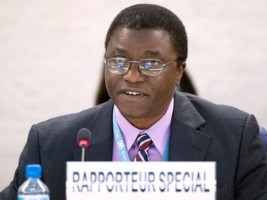Q&A with Mr. Chaloka Beyani, Special Rapporteur on the Human Rights of Internally Displaced Persons, about his visit in Cote d'Ivoire

Q&A with Mr. Chaloka Beyani, Special Rapporteur on the Human Rights of Internally Displaced Persons, about his visit in Cote d'Ivoire
UNHCR ABIDJAN, 20 Jun 2014
URL: http://data.unhcr.org/cotedivoire

Q&A with Mr. Chaloka Beyani, Special Rapporteur on the Human Rights of Internally Displaced Persons, about his visit in Cote d'Ivoire
Plus d'infos ::
Question and Answers with Chaloka Beyani, Special Rapporteur on the Human Rights of Internally Displaced Persons
The UN Special Rapporteur on the human rights of internally displaced persons, Chaloka Beyani, visited Côte d’Ivoire from 16 to 20 June 2014 to conduct a follow up mission to his last visit in July 2012, when he examined the overall situation of internally displaced persons (IDPs) in the country. Mr. Beyani met with representatives from the Government, UN partners, and civil society, among others.
Question: Mr. Beyani, based on the conversations you’ve had with internally displaced persons (IDP) here in Côte d’Ivoire, do you think the situation has improved since your last visit in 2012?
Answer: The Government has made notable advances on matters relevant to IDPs. It passed an important law in August 20113 that allows foreign-born residents living in Côte d’Ivoire since before independence, as well as their descendants, to become citizens. This is an important step in normalizing the IDPs’ situation, as it grants them a series of rights and benefits that were previously out of reach. The Government has also accelerated the process of providing birth certificates and other crucial documentation to IDPs. The State’s ratification of the Kampala Convention, which is the world’s first continent-wide instrument that legally obliges African to protect and assist IDPs is another milestone. Last but not least, there have been notable improvements in the country’s overall security situation and social cohesion levels, including through the implementation of a national Commission for Dialogue, Truth and Reconciliation.
However, significant challenges remain and need to be addressed. The basic conditions of IDPs are still the same as they were in 2012: their living conditions are dire; they are not receiving basic services; and are particularly vulnerable to the country’s persistent problems relating to livelihoods and land tenure. In addition, the demobilization and reintegration of former combatants remains a sensitive issue and has not been fully tackled. If the process does not go smoothly, the consequences of recurrent violence would be severe for the IDPs. The risk of insecurity and its ramifications for IDPs should be a priority for the newly-created Comité de coordination élargi, which the Government put in place to formally re-appropriate its responsibilities for the security, economic well-being and protection of the Ivoirian people. In addition, while the law regarding the registration of birth certificates has been passed, its actual implementation has been postponed several times.
Question: Are there new challenges that have arisen since your last visit in Côte d’Ivoire?
Answer: Côte d’Ivoire is about to undertake an ambitious census process, and the pervading distrust among many of the IDPs vis-à-vis the Government could make this challenging. The upcoming presidential elections in 2015 represent a real deadline to register the IDPs in the census so that they can participate and not feel further disenfranchised and alienated from the rest of Ivoirian society. Another important issue is the eviction and relocation of communities currently living in Côte d’Ivoire’s “classified forests”, in the west of the country. This process could lead to additional displacement if it is not handled effectively, with measures put in place to ensure that the people concerned are closely consulted and that they have access to sustainable livelihoods in their new homes. The attacks that took place in the west (Fete and Grabo) earlier this year have led to new waves of IDPs and increased needs for emergency humanitarian assistance – at a time when the support provided by the international community is being scaled down and transferred back to the Ivoirian authorities. One of the first challenges of the Comité de coordination élargi will be to relieve this pressure and coordinate immediate humanitarian assistance as well as longer-term development activities.
Question: Côte d’Ivoire was selected – along with Kyrgyzstan and Afghanistan – as a pilot country for the UN Secretary-General's Policy Committee Decision on Durable Solutions. How is the country a unique case? What experience can it bring to other countries with similar IDP conditions?
Answer: In Côte d’Ivoire, there is a momentum to actually find durable solutions for IDPs, both on the part of the United Nations, in particular UNHCR and UNDP, and of the Government, led by the Minister of Solidarity, Family, Women and Children Affairs. It is essential to sustain this momentum, and also to engage development actors so that they include the needs of IDPs in their plans. An essential step will be the profiling of the IDPs, including their location and their needs, which will be conducted after the census. What is unique in Côte d’Ivoire is that the national census will actually include questions about the IDPs. The challenge is that it is viewed by all parties as a constructive step to be better informed about IDPs, and then lead to concrete actions to support durable solutions.
Question: Finally, what is your assessment of the potential impact of the upcoming presidential elections on Côte d’Ivoire’s IDPs?
Answer: If the IDPs are not involved in the lead-up to the polls and do not participate, they will be completely disenfranchised, and this could reinforce existing regional political currents and alliances. There is a real need to raise awareness among them about the implications and meaning of these elections, the importance of their participation, and their role as citizens of the country.